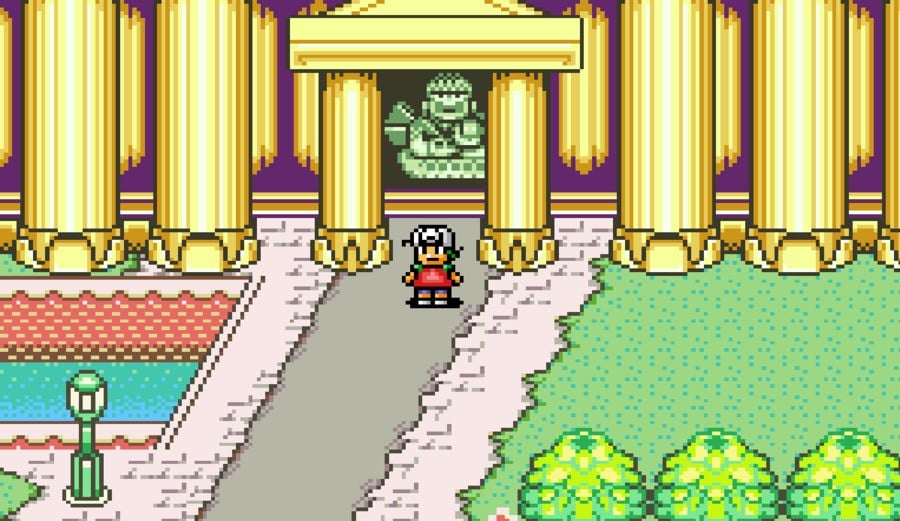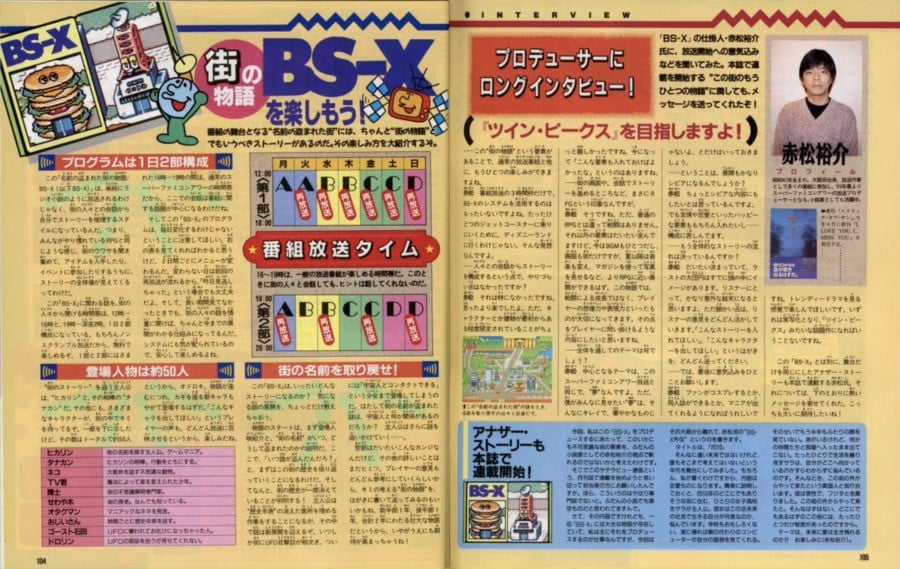
If you've spent any time looking into the history of the Nintendo Satellaview (Nintendo's Japanese exclusive satellite service from the 1990s), then you've probably encountered its RPG-like interface BS-X: Sore wa Namae o Nusumareta Machi no Monogatari (commonly translated as BS-X: The Town Whose Name Was Stolen in the West).
The game/interface was distributed on a special slotted cartridge that came bundled with the Satellaview add-on and was notable for its EarthBound-esque town that allowed users to purchase items, speak to NPCs, and enter buildings to download data to 8mbit data packs (this included things like games, magazines, and images).
Much like popular live-service games that most of us will be familiar with, it even contained its own original story that unfolded over subsequent updates, which saw players trying to unravel the various mysteries of the town and its curious inhabitants (note: this was never finished according to the researchers/preservationists like LuigiBlood and Cabbusses).
Detailed information about this has been pretty hard to come by over the years. However, recently, with the help of the Japanese to English Translator Stephen Meyerink, we were able to translate an old Satellaview-Tsushin interview from May 1995 (before the launch of the Satellaview) with the BS-X writer/Super Famicom Happy Hour producer Yusuke Akamatsu.
Akamatsu was a fiction writer who was best known at the time for books like "Scratch of Sun," and the then-upcoming "I, LOVE YOU, I, MISS YOU". He also contributed a serialized side story to BS-X in the pages of Satellaview-Tsushin called 2010. You can read the interview in English below. It sheds a little more light on the development of BS-X's story:

Q. With this "town story" element, players will have something else to enjoy in addition to the usual broadcast fare [on Satellaview], won't they?
Akamatsu: It does feel like it would be a waste to use the BS-X system for only the 3-hour spans of broadcasting, wouldn't it? You don't go to Disneyland to ride one single roller coaster, after all. That's the idea behind this.
Q. Were there any challenges when it came to constructing a story via conversations with people?
Akamatsu: Not especially. It was easier than I expected. That said, it was somewhat difficult in that to some extent, the characters and buildings and what have you were limited from the outset. I do find myself thinking I should have included certain other elements now, though.
Q. The town scene and progressing through a story via dialogue really does give it an RPG feel, though.
Akamatsu: Yes, it does. But unlike a normal RPG, it has no combat, though it does include most of the other elements you'd expect from one. Right now there's only one background music track, and you can only go to the city, but after the summer we should be able to change the music, show photos via magazines, and develop it into something closer to a full-fledged RPG. In this particular story, the player's powers of imagination and expression are more important than growth via combat. I'd like the content to question players in that capacity.
Q. Is there an overall theme throughout the game?
Akamatsu: The central theme is the same as the Super Famicom Hour broadcasts: "dreams." That said, let's just say that the dream I want to show everyone isn't something quite so pretty or glamorous.
Q. Does that mean things will play out in a particularly cold or relentless way?
Akamatsu: I would like it to be a little more like that, yes. But of course I also want to include happy elements, like friendship and romance. The construction of it all is something I've really been wracking my brain over.
Q. Has the flow of the overall story already been decided?
Akamatsu: It's mostly all decided, and I already have a vision in my head of the final conclusion. I think it'll be a pretty unexpected ending for the listeners. That said, in terms of the finer details, I'll be listening to listener feedback. Please do keep sending me notes and postcards telling me if you'd like certain types of stories or characters to appear.
Q. To close with, please say a few words about your passion for this project.
Akamatsu: I'd love to see fans get so into the experience that they do cosplay or make doujinshi. I'd like them to be able to enjoy it with the same feeling they would as if they were watching a trendy TV drama. I'd certainly have no complaints if it got turned into a live-action show and became a much-discussed work like Twin Peaks.





